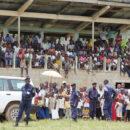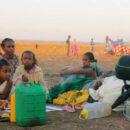Insiders Insight: Tunisia’s president dies. What now?


Funeral of Tunisia president Beji Caid Essebsi who died on July 25th, 2019. Credit: Issam Barhoumi.
African Arguments is and always will be freely-accessible to everyone.
But we also have a separate spin-off product called the Africa Insiders Newsletter. It consists of weekly emails with additional snappy insights on topics such as elections, conflict, health and more. It’s for those who want a bit extra and comes with a small subscription fee:
- Regular: $10/month or $100/year
- Patron: $15/month or $150/year. The extra 50% goes straight to funding African Arguments.
- Student/limited income: $2/month or $20/year.
The profits from the newsletter go into funding African Arguments’ free content.
Click here to SUBSCRIBE.
Table of contents:
- What everyone is talking about
- Tunisia’s first freely-elected president dies
- What we are talking about
- Ghana and Ivory Coast’s ‘choctactic’ setback
- State of the earth
- Hunger strike for climate change action
- Hear this word
- Will Tanzania put girls at risk…again?
- Report of the week
- Nigeria’s other religious crisis
- If you’ve got time, read this!
Click here to SUBSCRIBE.
Free segment: What everyone is talking about
Tunisia’s first freely-elected president dies
The essentials: Beji Caid Essebsi died on Thursday aged 92. He was Tunisia‘s first democratically-elected president and the world’s oldest serving head of state. Speaker of the Parliament Mohamed Ennaceur was sworn in as interim president. A permanent successor will be elected on 15 September.
The context: Tunisia was the birthplace of the “Arab Spring” in 2011. After months of protests, long-time ruler Zine El Abidine Ben Ali fled the country, leading to consecutive interim governments and the country’s first free elections in October 2011, which led to the formation of a constitutional council. President Essebsi was elected in December 2014 after his party Nidaa Tounes won the parliamentary election a few months earlier.
The 92-year old Essebsi was generally perceived as an integrative figure, intent on leading the country through a tumultuous time while protecting the spirit of the 2011 revolution. He proposed several reforms aimed at strengthening the rights of women and the right to vote, most of which were stalled by political infighting in his party and opposition by the conservative Ennahda party. At the same time, he fought a bitter power struggle with Prime Minister Youssef Chahed, which resulted in Chahed leaving Essebsi’s party.
The good: Essebsi will be remembered as a transformative politician, not for flair and bombast, but for his capacity to integrate Tunisia’s various competing social and political factions into a national dialogue. His presence and guidance was essential in helping Tunisia avoid both a relapse into autocracy, like Egypt, or a disintegration into violence, like Libya.
The bad: With Essebsi leaving the stage, Tunisia’s many political conflicts remain unresolved. While Essebsi had ruled out running for another term and was scheduled to step down in a few months anyway, his continued presence would surely have helped to guarantee a continued dialogue between parties and social currents. His untimely death has also slightly changed the electoral calendar, which probably upended the political calculations of the major parties, introducing a certain level of uncertainty into the coming months.
The future: Instead of waiting for the results of the parliamentary elections in October before deciding on a candidate to run for the presidency, Nidda Tounes, Prime Minister Chahed’s Tahya Tounes and Ennahda will have to make their decisions now. Ennahda refrained from running a candidate in 2014, which lowered fears by secularists of the conservative Islamist party taking control of the state. Tunisia also continues to be confronted with substantial economic hardship. Different approaches both to social and economic policy, as well as interpretations of the legacy of the 2011 revolution, will dominate the coming campaigns.
- Tunisian president’s death changes country’s political landscape (The Arab Weekly)
- Caid Essebsi shielded democracy but also the state (The Arab Weekly)
- Why President Essebsi, and Tunisia, Stood Alone (Foreign Affairs)
- Tunisia’s Democracy Is Tested, and Pulls Through, After a President’s Death (New York Times)
- Is Tunisia Really Democratising? (German Institute for International and Security Affairs)
Discuss with @PeterDoerrie on Twitter
Click here to SUBSCRIBE.
The Africa Insiders’ Newsletter is a collaboration between AfricanArguments.org and @PeterDoerrie, with contributions from @_andrew_green, @shollytupe, and assistance from Stella Nantongo. Part of the subscription revenue is funding in-depth and freely accessible reporting and analysis on African Arguments.






